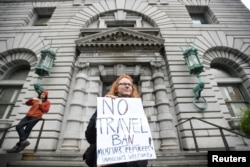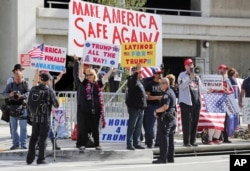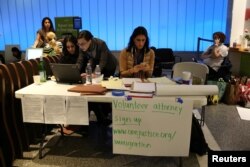There is understandable confusion around the world about U.S. immigration and refugee policies in light of President Donald Trump's executive order and the subsequent court challenge to that order. VOA has invited its worldwide audiences to submit their questions about the policies via Facebook and attempts here to answer some of the most frequently asked questions.
The court case
Do federal judges have the right to veto the president's executive order? What rights does the president have if that happens?
No, judges cannot veto the president's order. Judges can only rule on specific cases that are brought to them. In the case of the 9th U.S. Circuit Court of Appeals in San Francisco, the three appeals court judges were asked to rule very narrowly on whether a ban on the order, called a temporary restraining order (TRO), should remain in effect. The judges decided that it should. Meanwhile, lower courts continue to move through the process of looking at the constitutionality of the entire executive order. If a court were to find the order unconstitutional, the president could appeal the ruling, first back to the appeals court, and if he got no satisfaction there, to the nation's highest court, the Supreme Court.
Who is challenging the travel ban in court?
About 60 lawsuits have been filed against the ban. Some of these were by individuals who initially could not get back into the country, and their suits have been dropped. About two-thirds of the lawsuits are proceeding, according to the Civil Rights Litigation Clearinghouse.
What will happen if the Supreme Court finds the travel ban is unconstitutional?
If the nation's highest court finds the ban unconstitutional, the order cannot take effect. The president could try to write a new order that would pass constitutional muster.
If the case ends up at the Supreme Court, and its voting result is 4-4, who wins?
If the Supreme Court ties, the ruling remands back to the appeals court. So whatever that court ruled would stand.
If the judicial stay of the travel ban is sustained by the courts, how long does that last?
The current judicial stay is a temporary restraining order. If it is upheld, it will stay in effect until the district court reviews filings and makes a decision on a preliminary injunction, which is a longer stay. The injunction would remain in effect while the court decides the constitutionality of the executive order.
In the American system of checks and balances, who keeps the courts in check? Who can punish a judge who abuses his power?
Courts are kept in check by other courts. A ruling can always be appealed to a higher court, up to the Supreme Court. Judges are appointed by the president but have to be approved by Congress. They can also be impeached by Congress and removed from office.
Does the U.S. Department of Justice (DOJ) belong to the executive branch? Besides the court system, what other agencies are under the US judiciary branch?
Yes, DOJ is part of the executive branch. And the federal court system is part of the judiciary branch. There are some 60 agencies within DOJ. You can view them here. ((https://www.justice.gov/agencies))
The executive order
How were the seven countries affected by the travel ban selected?
The countries targeted in Trump's executive order on immigration were initially identified as "countries of concern" under the Obama administration. Former President Barack Obama in December 2015 signed a bill that placed limited restrictions on certain travelers who had visited Iran, Iraq, Sudan or Syria on or after March 1, 2011. Two months later, the Obama administration added Libya, Somalia and Yemen to the list in an effort to address "the growing threat from foreign terrorist fighters." The Obama-era restrictions were not as stringent as those in the Trump travel ban.
Can other countries be added or removed from the list?
Yes, countries can be added to the list. The secretary of homeland security is working with the secretary of state on new screening rules for foreign nationals who want to visit the U.S. The order says that countries that do not comply with those criteria will be added to the list.
Can the government grant waivers to the travel ban for individuals or classes of individuals?
The secretaries of state and homeland security may issue visas or other immigration benefits to nationals whose countries are on the banned list on a case-by-case basis.
How does Trump's executive order on immigration affect undocumented immigrants?
There are currently three executive orders on immigration. One is the travel ban. Another is on border security and the wall. The third one, "Enhancing Public Safety in the Interior of the United States," very much affects undocumented immigrants. It appears to expand the definition of who would be eligible for deportation, which would mean more undocumented immigrants will be deported. It also threatens to withdraw federal funding from sanctuary cities, which could limit undocumented immigrants' protection. Three lawsuits are pending against this piece of the order.
Is it true that some people arriving at U.S. airports are being pressured to renounce their green cards?
No. Not now, although it did intially happen with a very small number of individuals.
How does the ban affect green-card holders if they leave the United States for a visit and want to come back?
The Trump administration initially included green-card holders in the ban but then changed its mind and said they would not be included.
Will this travel ban affect people who have Temporary Protected Status (TPS)? What will happen to those Haitian immigrants with TPS after the expiration date of their status in July of this year?
The travel ban executive order does not address TPS directly. Immigration lawyers say TPS travelers will most likely be subjected to additional screening and those from the seven banned countries should be aware the president can rescind TPS at any time. There is no way of knowing what will happen after the expiration of Haiti's TPS.
What will happen to the green-card lottery system?
To be determined. There have been media reports that the Trump administration intends to further restrict legal immigration in a future executive order.
The political issues
What is the evidence for a threat to U.S. security to justify the travel ban?
The 9th U.S. Circuit Court of Appeals, which left the stay on the travel ban in place Thursday, asked the same question. "The government has pointed to no evidence that any alien from any of the countries named in the order has perpetrated a terrorist attack in the United States," the three-judge panel said in its ruling. The court conceded that it does not have access to classified information but pointed out that the government could have provided classified documents to bolster its case and did not.
Some people say the travel ban will actually increase the risk of a terror attack in the United States. Why do they say this?
Ten former national security, foreign policy and intelligence officials filed a brief with the appeals court that makes this argument. The group, which includes two former secretaries of state, notes that the executive order would endanger U.S. troops in the field, disrupt counterterrorism and national security partnerships, aid Islamic State propaganda and recruitment efforts by feeding the narrative that the U. S. is at war with Islam, and endanger intelligence sources in the field. "It will hinder relationships with the very communities that law enforcement professionals need to address the threat," the group adds.
Why are so many Americans protesting against the travel ban?
Many Americans are proud that America is a country of immigrants. They also like to think of the U.S. as an open and welcoming country. The travel ban is an offense to both beliefs. "The order offends our nation's laws and values," wrote the group of foreign policy experts cited above.
Is this travel ban the same as the ban on Muslims that Trump promised during his election campaign?
That is a hotly debated question. Trump and members of his administration have said in no uncertain terms that the travel ban is not a Muslim ban. But the question is at the heart of many of the court suits that have been brought against it. The suit brought by the states of Washington and Minnesota (the one that went up to the 9th U.S. Circuit panel) points out that Trump repeatedly called for a Muslim ban on the campaign trail. Less than two weeks after his inauguration, he signed an executive order banning all Syrian refugees and travel from seven predominantly Muslim countries. In addition, the suit says, "President Trump has made clear that one purpose of the order is to favor Christian refugees at the expense of Muslims." But the states also suggest discriminating against Muslims may not have been the sole purpose of the order but only a "motivating factor."
Do the U.S. opponents of the travel ban have any options other than the court challenges?
No.
Now that the stay on the travel ban has been upheld, how does that affect the administration's ability to issue future executive orders?
Not at all.

















